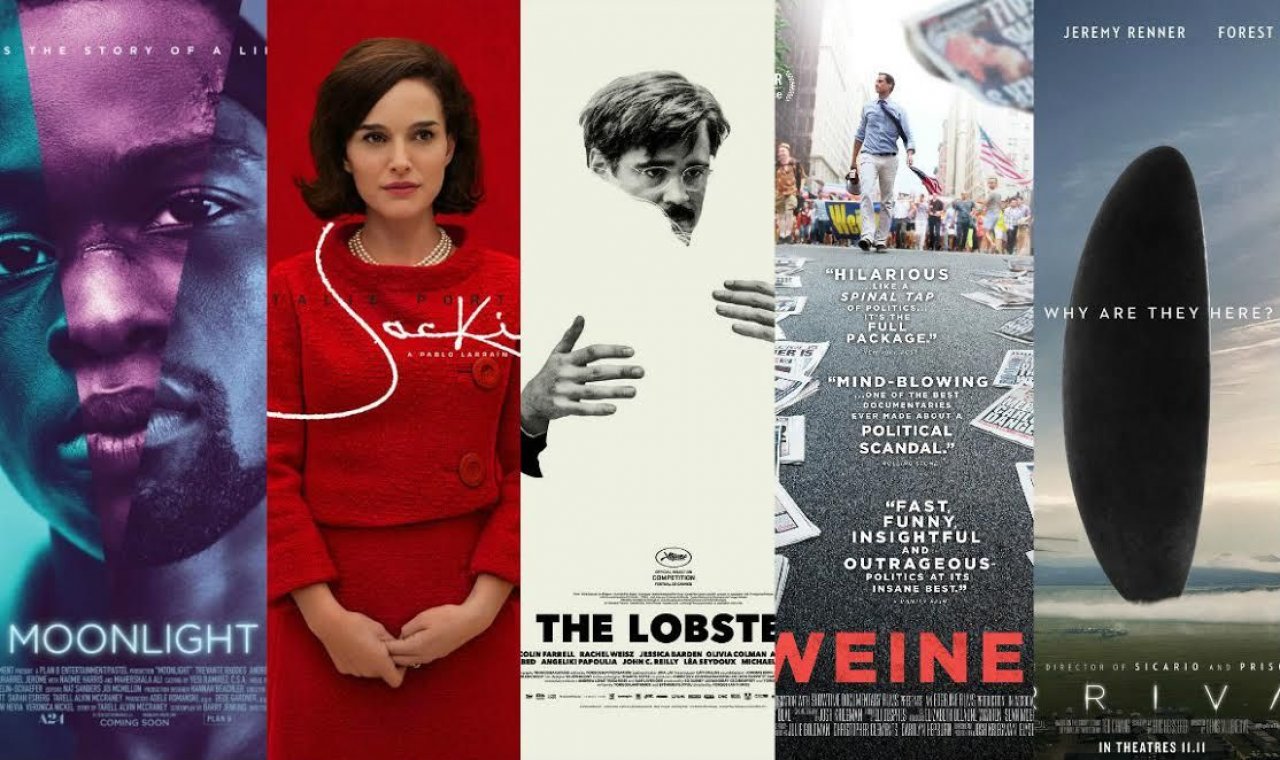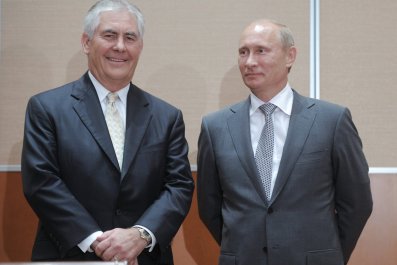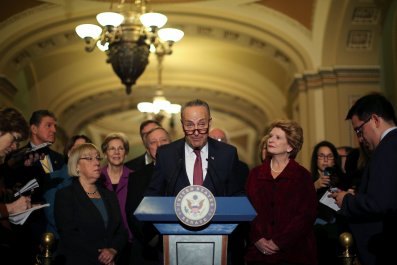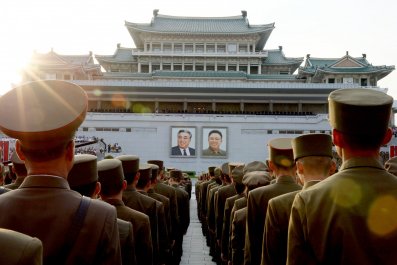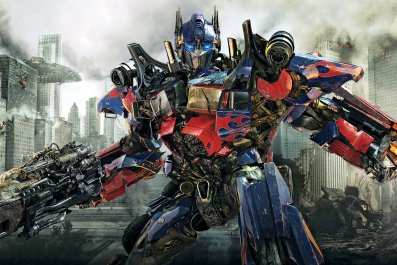Movies promise escapist glee. But it's 2016, and politics and entertainment are outright inseparable. This was the year a damn Ghostbusters reboot sowed hysteria in the "men's rights" community; it was the year the theater became a site of fierce division when Vice President-elect Mike Pence decided to attend Hamilton. And 2016 was the year a reality-TV personality ascended to the presidency and every movie star and his mom was asked to weigh in.
So our favorite movies of 2016 aren't necessarily feel-good flicks. Great cinema can be escapist, but it can also reflect the imperfect world we occupy in slightly more perfect color: the grief (Manchester by the Sea, Jackie), the oppression (Moonlight), the ugly spectacle of politics (Weiner), the collapse and ultimate inadequacy of language (Arrival), the demonic goats and witches (The Witch). Well, no witches yet—that's in store for 2017.
Here are our very favorite films of the year, ranked in alphabetical order. (Some, like The Witch, received a festival run in 2015 but not a U.S. theatrical release until 2016.) Happy watching.
1. ALLIED
Let's be honest: The big question isn't who dies at the end of Allied (spoiler alert: One of the star-crossed lovers does die) but whether the on-screen chemistry of its stars, Brad Pitt and Marion Cotillard, was really worthy of all those real-life rumors of a scorching affair between the two that ultimately ended Pitt's marriage. In this case, the answer is no. In fact, for most of the film, Cotillard, who plays a steamily coquettish French Resistance fighter (Marrianne Beauséjour), continually makes awkward passes at Pitt (Max Vatan), an intelligence officer, while the two risk their lives behind enemy lines in 1942 North Africa. For lovers of the World War II classic Casablanca, get ready for obvious overtones. We watch Max and Marianne fall in love as they assassinate people, escape to London and marry. They soon have a child, but as the war rages on, Max learns to his grave dismay that all may not be as it seems in his otherwise blissful marriage. Thus begins his secretive campaign to find out—before his superiors do—whether he is sleeping with the enemy. The moral of this story: When in doubt, talk to your wife. The alternative may be deadly. —Leah McGrath Goodman
2. ARRIVAL
Aliens arrive on earth, but they don't speak our language. That's the concept of Arrival. To make a good sci-fi film, you need more than a good idea. Arrival's concept is its strongest asset by far, but director Denis Villeneuve, who will no doubt become one of the greatest of his generation, has taken a creative nugget and expanded it to create a gripping tale of time, language and love, with an elegant and tangible realism that makes it unique in comparison with its counterparts. Amy Adams excels in one of her best roles, which is something of an achievement considering how many great parts she has had. Bradford Young's visuals are sublime, while Oscar winner Jóhan Jóhannsson's score bubbles and broods in what is one of his best soundtracks. The film has been compared to 2001: A Space Odyssey or the more recent Interstellar, and I don't disagree. Villeneuve, like Stanley Kubrick and Christopher Nolan, understands how to create not just a visually stunning film but an enigmatic tone that envelops you in the world. Some viewers may find Arrival a touch ostentatious, but what good film doesn't get a bit pretentious sometimes? —Jordan Saville
3. CAPTAIN FANTASTIC
This movie is the story of the evolution of an eccentric American family in the days after their mother dies. Swedish looker Viggo Mortensen plays Ben, an idealist who has taken his six children to be home-schooled and trained in self-sufficiency off the grid, somewhere in the mountains of Washington state. Unlike most doomsday preppers, he is a secular humanist, and he's gone off the grid not to await a race war or nuclear Armageddon but to give his kids an anti-materialist, organic lifestyle. When his wife dies, he and the kids are forced out of the woods and back into society. Their clashes with authority, including robbing a grocery store to "Free the Food" in celebration of Noam Chomsky's birthday, are especially heartwarming acts of rebellion to watch in the Age of Trump. Musical and erudite, they are the radical American version of the Sound of Music's von Trapp family. Writer and director Matt Ross (who also acts in the HBO series Silicon Valley) loosely based the idea on his own childhood experiences living with his mother in various communes in the 1980s. For Mortensen's many fans, he also offers a full frontal nudity scene. —Nina Burleigh
4. CHRISTINE
If the film Christine is anything to go by, the journalism industry hasn't changed much since the 1970s. Christine Chubbuck, a local television reporter in Sarasota, Florida, is a smart, passionate and wryly funny journalist who clashes with an explosive boss who prods her for juicier stories and reminds her that "if it bleeds it leads." It's a mantra she internalized right until the end. Chubbuck, played by a remarkable Rebecca Hall, also struggled with depression and made history in 1974 when she shot herself live on the air, later dying from her wound. The film explores Chubbuck's life leading up to the incident and the inner workings of a small 1970s newsroom dealing with many of the same problems that plague the media today. Thankfully, we don't see the moment of Chubbuck's death. Her story lodged itself in a macabre corner of American culture and is mistakenly cited as the inspiration for another great film about journalism, Sidney Lumet's Network. Hopefully equal attention will now be paid to Chubbuck's life. —Lucy Westcott
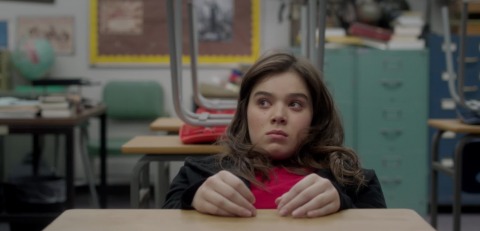
5. THE EDGE OF SEVENTEEN
High school sucks. This movie doesn't. The Edge of Seventeen is a film about outcasts, by outcasts, for outcasts. Newcomer director Kelly Fremon Craig wrote the sharp script about a brainy, alienated 11th-grader whose life spirals into despair after her best friend hooks up with her brother. Then she found the best possible actress for the part: Hailee Steinfeld, whose performance pairs self-loathing with tenderness and warmth. Edge of Seventeen crackles with that sense of irredeemable humiliation that's inherent in the high school experience, and it has a lot to say about the real crisis of teen depression without tiptoeing into mawkishness. Woody Harrelson is excellent as Steinfeld's ornery teacher. As the movie's title suggests, the soundtrack is great too. Oh, and it's illegal to end a blurb about a great teen movie without mentioning John Hughes, so here: John Hughes John Hughes John Hughes John Hughes. —Zach Schonfeld
Related: The Edge of Seventeen is the best teen movie since whatever the last great teen movie was
6. HAIL, CAESAR!
The trailers were well tantalizing: A-class actors, stunning visuals and great punch lines. And the Coen brothers' latest film delivered on that promise with great, skitlike impromptu scenes, like the hilarious "No Dame" song by a tap-dancing Channing Tatum or Tilda Swinton's dual performance as two reporter twins. Before La La Land gives its own homage to Hollywood's golden age in January, Hail, Caesar! offers a greedier and funnier take on the industry's secret. —Claire Toureille
7. HELL OR HIGH WATER
I admit I was initially drawn to director David Mackenzie's Hell or High Water because it stars Chris Pine, who plays Captain Kirk in the Star Trek reboots. Pine is terrific as a small-time bank robber who's the opposite of Kirk; rather than being in command, he's knocked about by events he can't control. Ben Foster plays his brother and partner-in-crime, and the relationship between them is one of the highlights of this engaging film. The other is the laconic Texas Ranger who's pursuing them, played wonderfully by Jeff Bridges. If you liked No Country for Old Men, don't miss this one. —Paul Raeburn
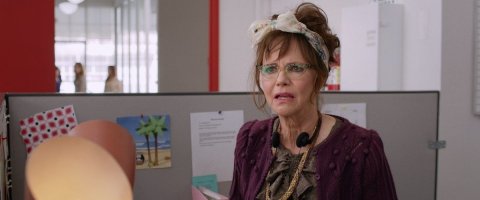
8. HELLO, MY NAME IS DORIS
Old people get crushes too. That's basically the moral of Hello, My Name Is Doris, in which Sally Field plays an eccentric woman named Doris who has a debilitating crush. What's funny is whom she's crushing on: a much younger and hipper colleague named John (Max Greenfield). And what's impressive is how Michael Showalter's movie avoids all the obvious directions and cheap laughs this could go for. Field makes Doris—an utterly ridiculous character, who hoards junk and seeks love advice from a preteen—seem real and worthy of the viewer's sympathy. Here is a winning movie about being a loser. Like most real-life crushes, it's funny and a little sad and also kind of sweet. —Zach Schonfeld
9. JACKIE
Natalie Portman will win the Oscar or she won't. She gets the accent right or she doesn't. Lee Harvey Oswald acted alone or he didn't. Who cares? It doesn't matter. Jackie is not a movie about fixed truths. It is a movie about a world unmoored, about a week in which the dull machinations of daily life were devoured whole by national trauma: JFK's assassination. A personal trauma too. The essence of Portman's deeply convincing performance is this: She embodies the most glamorous first lady in modern American history in mannerisms and voice, tears this invariably composed character apart and fills her with grief and existential rage. Pablo Larraín's film is tightly wound and hypnotic. There is no room for nostalgia. The set design and visuals capture 1963; the screenplay captures devastation. In the teetering aftermath of one national nightmare, why not revisit another. —Zach Schonfeld
10. JULIETA
Who but Pedro Almodóvar would think to combine three different Alice Munro stories into one nonlinear melodrama as sweeping and affecting as Julieta? And who but the cult-adored Spanish filmmaker could make it work? Almodóvar redeems himself after 2013's blah I'm So Excited with this slyly enchanting puzzle of a film. It's another entry in his "cinema of women" oeuvre. Like much of the director's best work, Julieta is fascinated—no, haunted—by the cruel weight of the past: Adriana Ugarte (young Julieta) and Emma Suárez (older Julieta) trade performances as an emotionally withdrawn woman whose personal history reveals her present predicament when she is overcome with grief upon seeing an old acquaintance. The key to this film is that the two actresses play the same character but not the same person, because that's what time does to us—it wears us down and corrupts our essence and alters who we are. This is a heavy melodrama but not a humorless one: There is sex, there is death, there is a dazzlingly bright color scheme. Long live Almodóvar. —Zach Schonfeld
11. THE LOBSTER
This meditation on modern love, by Greek director Yorgos Lanthimos, sticks viewers in a dystopian, post-Tinder world, where finding a romantic partner is necessary for basic survival. In accordance with city law, all single people are shipped off to a special hotel, where they're required to find a mate in 45 days or be transformed into the animal of their choosing and then released into the woods. Recently dumped by his wife, David (Colin Farrell) faces some desperate, dark stuff at the hotel. Just days away from his imminent life as a lobster, he makes a risky escape from the hotel to the woods. There, he finds a group of outcasts who have chosen an equally miserable reality—to permanently camp in the wilderness and commit to a life of celibacy and flying solo. David meets the woman of his dreams (Rachel Weisz) among the motley crew, and they're soon forced to make dangerous choices in a community where true love and lust are verboten. —Jessica Firger
12. LOVE & FRIENDSHIP
It's been a dark year for women, what with our fellow Americans electing a president whose flirtation style consists of literally "grabbing pussy." But in Love & Friendship, writer-director Whit Stillman (The Last Days of Disco) serves up a precious little antidote to oafishness. In this 18th-century period drama based on a lesser-known Jane Austen work, Kate Beckinsale plays the subversive and gorgeous Lady Susan Vernon, a lively widow running out of funds and seeking a suitable and rich husband for herself and her daughter. Lady Susan is always the smartest woman in the room, but as she puts it, she's also too romantic to be satisfied by mere money. On her way to manipulating everyone around her and getting what she wants, Lady Susan is a font of memorable lines—"May his next gout attack end more favorably"—that made me want to watch it again. The dialogue delights the ear and mind; there are lots of laughs; and the spirit of Lady Susan, brought to impish life by Beckinsale, is balm for the female soul. That apparently is what Stillman intended. "I'm a pleasure seeker, and I want people to have 90 minutes of pleasure, not pain," he said recently. "To have a positive, interesting world, cheerful in some way—I like that." So do we. —Nina Burleigh
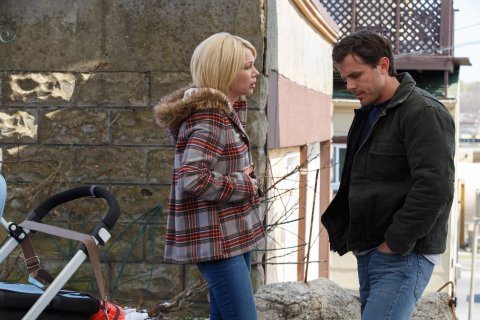
13. MANCHESTER BY THE SEA
There were no surprises when Manchester by the Sea, Kenneth Lonergan's opus about the crushing might of grief, racked up five Golden Globe nominations on Monday. The film received worthy film festival buzz earlier this year, notably for Casey Affleck's quiet turn as Lee Chandler, a man coiled with unresolved sadness and anger who becomes his nephew's guardian following the death of his brother. Despite delving into deep human woes—including alcoholism, familial grief and Massachusetts winter temperatures—Manchester by the Sea manages big, dark laughs, particularly from Lucas Hedges as Lee's sullen, traumatized nephew. Yes, the film's female characters needed better development; they were largely reduced to hysterical and damaged characters who do the film's men wrong. Sexual assault allegations against Affleck also don't seem to have derailed his shot at near-guaranteed Oscar glory. Still, you're unlikely to get a bigger hit to the heart while sitting in a movie theater this year. —Lucy Westcott
Related: Casey Affleck and Michelle Williams will break your heart in Manchester by the Sea
14. MOONLIGHT
The consequences of openly accepted social oppression often escape justice. The victims of a society's whimsical cruelty are usually pressured to forgive and forget, while oppressors are asked to reform themselves as an act of moral volunteerism. It is an impossible expectation, further, to ask children to prevent a crime, moral or legal, against themselves; when they become victims of acceptable crimes, the only justice given to them is often time itself. Moonlight tells an especially troubling story about a black boy who suffers and survives years of rejection and oppression, with little justice except what time provides him.
As we try to understand what it's like to grow up a poor, dark-skinned outcast son of a single, drug-addicted parent in Miami, Moonlight's main character, Chiron, struggles to find kindness in his world. The boy is judged into silence. Every day is managed within a fixed state of oppression. His body, the carrier of mind and its attractions, becomes a target of violence. Portrayed into adulthood by multiple actors over the course of the film, Chiron survives into adulthood, somehow. But adulthood is just another way of saying a long time has passed, and Chiron is like anyone else. Time has freed him from a difficult circumstance without offering him the justice and acceptance he is due. When Moonlight ends, it gives us, the audience, our time back. Let us spend it as gracefully as writer and director Barry Jenkins did, and task ourselves in how we might prevent the violence and oppression children cannot protect themselves from. —Margarita Noriega
15. NEIGHBORS 2: SORORITY RISING
Americans can agree on very little, but we can probably agree on this: It would be very, very bad to live next to a fraternity house, especially if you're a couple that's just had its first child. That was the premise behind Neighbors (2015), which starred the unlikely comedic trio of Zac Efron, fratboy extraordinaire, and the yuppie couple of Seth Rogen and Rose Byrne. Neighbors 2 updates the premise: Now our beleaguered couple is plagued by a renegade sorority, its main members played wonderfully, winningly by Chloë Grace Moretz, Kiersey Clemons and Beanie Feldstein. The film is oddly "woke," as the kids say, showing a sensitivity to cultural issues you wouldn't expect from a raunchy Hollywood comedy. And this movie is truly, truly raunchy. In a year that desperately demanded laughter, no movie made me laugh harder. —Alexander Nazaryan
16. NOCTURNAL ANIMALS
Designer-turned-director Tom Ford's first feature since 2009's A Single Man is a stylish psychodrama guaranteed to rattle the nerves of most viewers, or at least inspire some stress eating. Starring Amy Adams, Jake Gyllenhaal, Michael Shannon and Isla Fisher, the film compels viewers' attention with a double narrative. One is about a melancholic gallery owner in Los Angeles (Adams) with more than a few regrets. The other is a creepy and violent novel written by her ex-husband (Gyllenhaal) that keeps her up at night and serves as the ultimate tale of revenge or redemption—depending on the viewer's perspective on the world. —Jessica Firger
17. OTHER PEOPLE
Three revelations from Other People, Chris Kelly's quietly moving feature debut: 1) Molly Shannon is best known for comic work (especially SNL) but is also capable of taking on a difficult dramatic role. In this film, she encompasses a devastating array of emotions as a mother who is slowly dying of cancer. (The film's focal point is David, her adult son played by Jesse Plemons, who's just broken up with his boyfriend and now must steel himself for losing his mother too.) 2) Movies about cancer are inherently depressing; this one is also quite funny. Death is not some sly plot twist but a daily household reality. Along the way, David's parents (the homophobic father is played by Bradley Whitford) have a hell of a time experimenting with medical marijuana. 3) The 2001 cornball hit "Drops of Jupiter," by the band Train, is shockingly moving when encountered in the right context. —Zach Schonfeld
18. SING STREET
"What's he listen to?" the wise college dropout asks his kid brother, who is fretting about a romantic rival. "Genesis," the lad replies. "He will not be a problem," says the big brother. Irish filmmaker John Carney, who crafted a masterpiece with Once in 2007, returned in 2016 with another musical based in Dublin, about a bloke who's lost in love in 1985. How do you get the girl? Form a band. You can worry later about being a musician. If John Hughes and Cameron Crowe had ever collaborated on a film and given it a brogue, Sing Street would be that movie. —John Walters
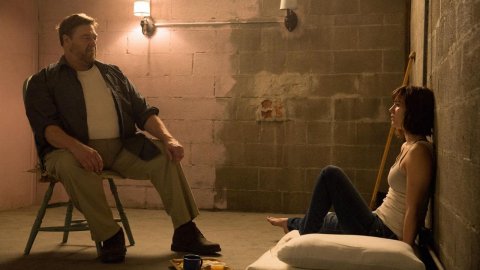
19. 10 CLOVERFIELD LANE
For anyone who's already a fan of writer and director J.J. Abrams (Lost, Alias, Super 8) or John Goodman, seeing this picture will require no cajoling. Abrams, who produced 10 Cloverfield in addition to the 2008 alien-invasion flick Cloverfield, says this latest sleeper hit was initially titled The Cellar but captured the spirit of its predecessor so fully that he decided rename it in homage. In truth, he says, the movies have nothing to do with each other, other than being "blood relatives." The newer film is a far tauter psychological thriller, with Goodman playing Howard, an intense, lonely man who has built a bunker on a remote tract of land in case of a Martian attack. And lo and behold, he determines there are Martians! Stumbling into this is Michelle (an outstanding performance by Mary Elizabeth Winstead), who finds herself saved by Howard—or so he says—following a car accident but is confused as to why he will not let her leave the bunker, where she wakes up from her injuries. The beauty of this film is that director Dan Trachtenburg is so sparing with the facts—dropping only the tiniest crumbs now and then—that could point to Howard being a madman or Michelle just being paranoid and ungrateful. As the two slowly build trust, Michelle has to make a decision: Will she venture out of the cellar to find out if Howard is telling her the truth? Of course, she does. This is the rare science fiction film where the windup is worth the payoff. —Leah McGrath Goodman
20. WEINER
In the blood sport of politics, as in high school, there is a pendulum: Some days it swings toward triumph, other days toward abject humiliation. In Anthony Weiner's 2013 mayoral campaign in New York, the pendulum swung so hard and swift toward humiliation it left some collateral chipping damage on the glass ceiling. Sex sells. Sexts don't. In this remarkably intimate documentary, Weiner is our hero: flawed, ambitious, sext-addicted and so desperately, nakedly hungry for redemption. He does not find it in a documentary confessional. The filmmakers, Josh Kriegman and Elyse Steinberg, are granted such a spectacular view of this slow-motion train wreck that even Weiner can't seem to explain why he granted it. The best documentaries are sometimes fortuitous accidents—Jules and Gédéon Naudet, who filmed the 2002 film 9/11, thought they were making a routine movie about a New York City firefighter—and Weiner is one of the very best. In June, theater audiences shook with laughter. Now the events of 2016 (including Weiner's brief, disastrous resurfacing in the final days of the presidential campaign) have reframed the film as an astonishing tragedy. No one's chuckling. —Zach Schonfeld
21. THE WITCH
I've seen whining that The Witch isn't really a horror film, which is a compliment, and a lie. It's scary, and exponentially smarter than shock shlock like Paranormal Activity and therefore so much more disturbing. It's not about cheap shocks; it's about the most fundamental kind of terror, about being chased in the dark by something worse than pain, worse even than death. The best comparison is with The Exorcist, in which it's clear that the battle over a little girl's soul is a war for the entire world.
The Witch would be great even if it weren't about wonderfully wicked witches, because it sucks you into the horrors of colonial life for Puritans in New England. You want real horror? Imagine being a pubescent girl with no heat, no plumbing, no privacy and a zealot father as unbending and self-righteous as Peter Thiel. Writer-director Robert Eggers was crazy enough to take these crazy people seriously—imagining that their Old Testament God is real, vengeful and cruel. And that Satan does lurk at the edge of those dark woods, promising pleasures both carnal and eternal. The Witch is also a beautiful movie, with haunting tableaus and replete with shots that echo Vermeer, the master of chicks with starched collars, and Goya, the master of unspeakable atrocities. —Bob Roe
Read more from Newsweek.com:
- We asked dialect experts to analyze Natalie Portman's accent in Jackie
- The quiet beauty of Barry Jenkins's festival hit Moonlight
- The Edge of Seventeen is the best teen movie since whatever the last great teen movie was



